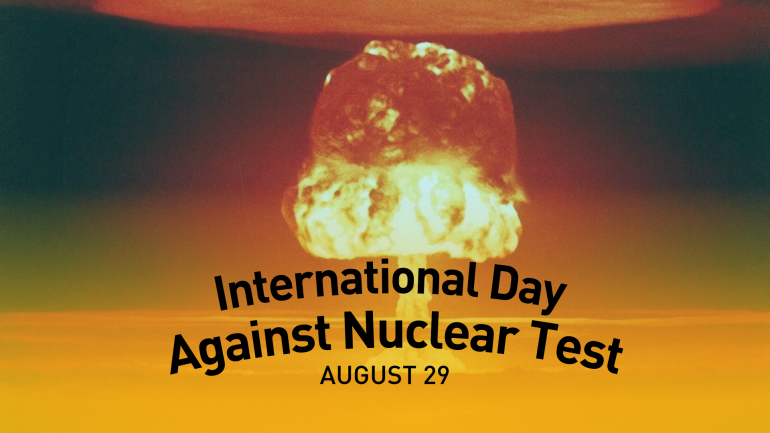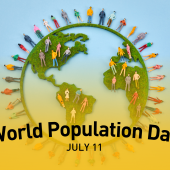International Day Against Nuclear Test

On 2 December 2009, the 64th session of the United Nations General Assembly declared 29 August the International Day against Nuclear Tests by unanimously adopting resolution 64/35. The resolution calls for increasing awareness and education “about the effects of nuclear weapon test explosions or any other nuclear explosions and the need for their cessation as one of the means of achieving the goal of a nuclear-weapon-free world.”
The resolution was initiated by the Republic of Kazakhstan, together with a large number of sponsors and cosponsors with a view to commemorating the closure of the Semipalatinsk Nuclear Test site on 29 August 1991.
2010 marked the inaugural commemoration of the International Day against Nuclear Tests. In each subsequent year, the day has been observed by coordinating various activities throughout the world, such as symposia, conferences, exhibits, competitions, publications, lectures, media broadcasts, and other initiatives. Since its establishment, many bilateral and multilateral governmental-level developments as well as broad movements in civil society have helped to advance the cause of banning nuclear tests.
Since nuclear weapons testing began in the mid-twentieth century, with the first test in 1945, nearly 2,000 have taken place. There has been little consideration of the devastating effects of testing on human life, let alone the understanding of nuclear fallout from atmospheric tests. Early on, having nuclear weapons was a measure of scientific sophistication or military might.
Hindsight and history have shown us the terrifying and tragic effects of nuclear weapons testing, especially when controlled conditions go awry, and in light of today's nuclear weapons which are far more powerful and destructive Subsequent incidents worldwide have provided compelling reasons for the need to observe the International Day against Nuclear Tests - a day in which educational events, activities, and messages aim to capture the world's attention and underscore the need for a unified attempt in preventing further nuclear weapons testing.
The Comprehensive Nuclear-Test-Ban Treaty (CTBT) bans all nuclear tests by anyone, anywhere. The Treaty has created and sustained a global norm against nuclear testing so powerful that fewer than a dozen nuclear tests have been conducted since it opened for signature in 1996.
For the CTBT to enter into force, it still has to be ratified by eight States from a list of 44 defined as nuclear technology holders in Annex 2 of the Treaty (China, DPRK, Egypt, India, Iran, Israel, Pakistan, and the United States). Once the Treaty has entered into force, on-site inspections can be requested by any State Party to verify whether a nuclear test has been conducted.
References:
[1] United Nations. International Day Against Nuclear Tests
29 August. Retrieved from https://www.un.org/en/observances/end-nuclear-tests-day
[2] CTBTO Preparatory Commission. International Day against Nuclear Tests. Retrieved from https://www.ctbto.org/news-and-events/international-day-against-nuclear-tests
[3] https://unis.unvienna.org/unis/en/events/2012/international-day-against-nuclear-tests.html
Radio Veritas Asia (RVA), a media platform of the Catholic Church, aims to share Christ. RVA started in 1969 as a continental Catholic radio station to serve Asian countries in their respective local language, thus earning the tag “the Voice of Asian Christianity.” Responding to the emerging context, RVA embraced media platforms to connect with the global Asian audience via its 21 language websites and various social media platforms.














